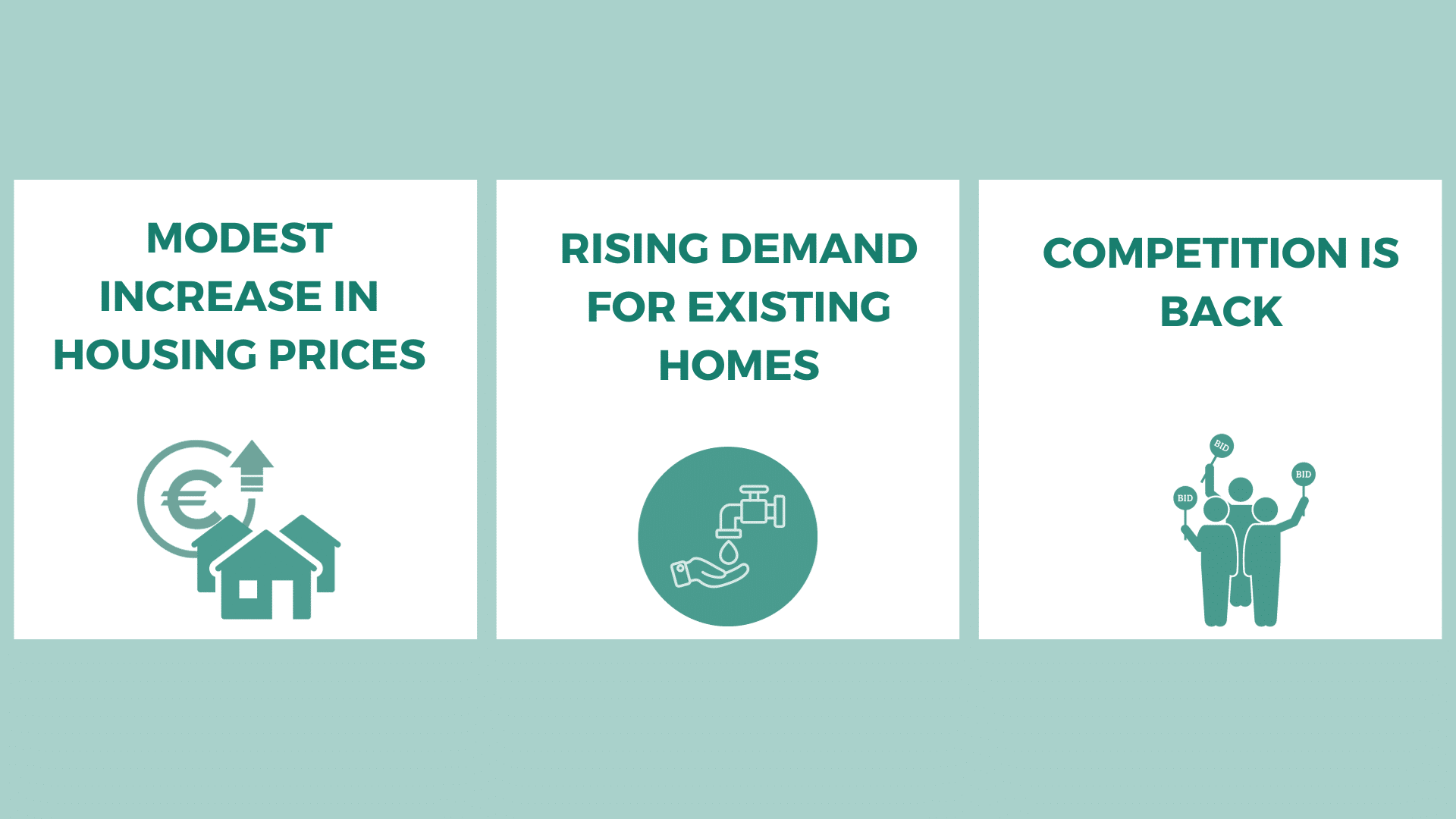
In 2023, significant shifts have occurred in the housing market, with prices experiencing a slight decrease, juxtaposed against a doubling of interest rates compared to 2021.
Now, we can notice the signs of recovery in the housing market. How is the housing market now? And what to expect shortly? We overview the latest updates and insights from the housing market offered by leading banks in the Netherlands.
-
In the third quarter of 2023, transactions in the housing market remained steady.
-
Prices of homes experienced a slight increase during this period.
-
This represented a 2.4% increase compared to the third quarter of 2022.
-
The average selling price of an existing home in the third quarter of 2023 was 422,000 euros.
-
The number of homes listed for sale decreased by 9% compared to the second quarter and 18% compared to the same quarter last year, leading to increased scarcity in the market.
-
The average selling price of a new construction home in the third quarter was 474,000 euros.
-
Prices for new construction homes have remained relatively stable for the past six months.
-
In the third quarter of 2023, 6,435 new construction homes were introduced to the market. This is 13% less than in the second quarter of 2023 and 16% less than a year ago.
-
In the third quarter of 2023, there was a 9.90% year-over-year decrease in the total number of recorded mortgage offer requests, amounting to approximately 93,000.
-
Moreover, because new mortgage interest rates are higher now, fewer people want to refinance their mortgages, and this caused a big 24% drop compared to last year in the number of people refinancing, with about 33,000 mortgage offers in total.
Increasing numbers of first-time homebuyers
Again, the number of first-home buyers drawn to the housing market has grown. This notable surge is remarkable, considering that the overall volume of home sales in 2023 was lower than that of 2022. One reason shows that first-time buyers' financial position increases despite the increased interest rate.
According to research by NMV (the largest real estate and appraiser association), first-time buyers mostly purchase smaller properties due to the substantial rise in property prices. Therefore, the average age of first-time homebuyers is also declining. In 2019, the average age of individuals purchasing their first home alone was 36 years. By 2023, this age has dropped to 34 years. The average age of the younger partner has decreased from 34 to 31 years among couples.
The housing market is still tight
According to the NVM (the Real Estate Agents' Association), there were 31,500 homes available for sale in the second quarter. This is much more compared to last year when there were only 25,000 homes for sale.
It is good to notice that the housing shortage still exists as we have fewer homes for sale than in 2012 when were 176,000 homes available.
Also, the recent data from the Funda Index report indicates how quickly homes sell and how often they sell for prices higher than listed. It highlights that the housing market is currently very competitive and challenging for buyers.
Increasing property viewings and competition
Buyer confidence is on the rise once more following a period of deceleration. An increasing number of individuals believe that now is an opportune moment to purchase a home.


Tops insights from ABN AMRO:
-
Affordability will improve very gradually through wage increases to compensate for increased inflation.
-
The transaction estimate for 2023 remains unchanged at -5%; for 2024, we will reduce this from +2.5% to -2.5%.
-
Housing prices have decreased. This year's price index was 6% lower than the peak of July 2022.
-
ABN AMRO predicts that housing prices will drop from -6% to -5% this year and from -4% to -3% next year.
-
Notably, older home prices are declining, whereas those of homes constructed have seen an opposite trend. This is related to the energy crisis we experienced the last year. In the future, buyers, while purchasing a property, will pay more attention to energy labels.
-
Private landlords are now selling more homes on balance than purchasing homes. Previously, it was the other way around.
-
The number of transactions among starters has grown. The waning interest from private landlords offers opportunities for first-time buyers.
Tops insights from Rabobank:
-
Rabobank expects property prices to drop by 5.2% this year, with prospects for market stabilization in 2024 as falling prices and rising incomes contribute to improved affordability.
-
Increasing incomes and stagnant mortgage interest rates are exerting a decelerating effect on house prices.
-
After nearly a year of falling, house prices have stabilized in recent months, with nominal prices for existing owner-occupied houses in June and July surpassing those of the previous month.
-
Potential homeowners are again more active in the housing market.
-
Throughout the remainder of 2023, existing owner-occupied house prices are projected to maintain relative stability, with an average decline of 3.5 per cent compared to 2022, while in 2024, a gradual resurgence is anticipated, with an assumed average price increase of 2.4 per cent over 2023.
-
Sales are not experiencing significant declines across all regions; it deviates from area to area in the Netherlands.
-
Constrained supply is likely to delay home sales further.
Schedule a complimentary introductory call with our mortgage specialists. We specialize in mortgages for expats and are dedicated to navigating you through the home-buying process.
-
Get clarity on your financial possibilities.
-
Access to a trusted network.
-
Highly competitive rates and flexible terms.
-
English translations of bank documents are shared.

- 100% Independent Advice




